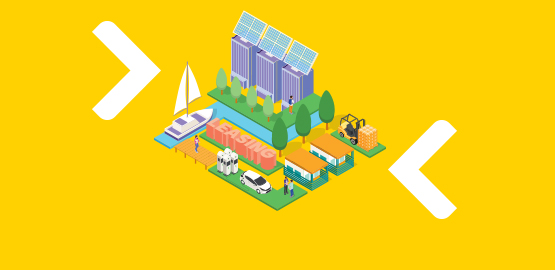What is leasing?
Choose your financing through Raiffeisen Leasing
Want to buy a vehicle, equipment, machinery or a boat?
Do you want to finance the use of an asset and the option of exchanging for a new model upon the expiry of the agreement?
Choose leasing – a way of financing entirely tailored to your needs and ability. Use the income generated from using the leased asset for your business to pay the lease instalments.
With leasing, you get to use the leased asset in return for monthly payments to the leasing company. After the settlement of the agreed payments, depending on the type of leasing, you can acquire ownership of the leased asset.
Advantages of Leasing
-

Saving Time and Money
Quick resolution and approval of your application without the obligation to mortgage and with no agreement authentication and additional guarantees required.
-

Simple Lease Cost Management
Customising the lease repayments according to your ability and needs.
-

Special Benefits
Take advantage of the special benefits on the insurance of the leased asset, as well as other benefits in collaboration with our partners.
Basic Leasing Terms
-

Lessor
In accordance with the Leasing Act, leasing companies are lessors. In order to perform the business of leasing, they must be approved by Hrvatska agencija za nadzor financijskih usluga. The leasing company purchases the asset from the supplier and gives the lessee the right to use it. Based on the purchase agreement with the supplier, the lessor exercises the right of ownership of the asset.
The lessor is the real (legal) owner of the asset in operating and finance leasing and the economic owner (the asset is recorded and depreciated in the accounts of the leasing company) in an operating lease, whereas the lessee is the economic owner in a finance lease.
-

Lessee
The lessee is a private individual or business company who, on the basis of a lease agreement, uses the leased asset, selects the asset with a supplier and approaches the leasing company (lessor) for financing.
-

Leased Asset Supplier
The leased asset supplier is a business company or private individual who sells the leased asset to the leasing company.
-

Asset
Leased assets are passenger cars, commercial vehicles, machinery, equipment, plants, boats, and real estate. The asset must have use-value for the right to use to be transferred to the lessee in accordance with the lease agreement.
Example from practice: In this case, the lessor is Raiffeisen Leasing, the lessee is you, our client (private individual or business company) who wants financing for a leased asset (for example, a car), and the supplier is the car dealership.
Contact Us
Raiffeisen Leasing
Visit us in one of our leasing offices
Raiffeisen Bank
Info on leasing can be found in all Raiffeisen Bank business centres

